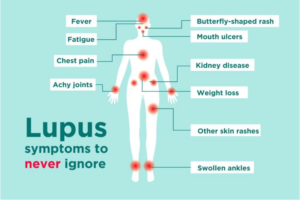Diet: Gut and autoimmune connection
70-80% of our immune system is found in the gut. In addition, our gut has trillions of micro-organisms which make up the gut microbiome. This microbiome plays an important role in regulating the immune system. Any imbalance in the microbiome can cause dysfunction in the immune system leading to autoimmune conditions. What we eat can affect our gut microbiome.
Stress reduction:
Chronic stress can impact the stress hormones which can contribute to inflammation. Stress can not only increase the risk of developing autoimmune diseases, it can also make it difficult to control your condition if you have already been diagnosed with one.
Exercise:
Although exercise does not directly treat autoimmune conditions, it has a positive effect on our immune system. Exercising regularly improves physical and mental well-being.
Micronutrient and supplements:
A number of supplements have been shown to be beneficial in Rheumatoid Arthritis. Some of these supplements can help with pain, similarly to NSAIDs, while others can decrease the level of inflammation and improve your gut microbiome. Keep in mind, every person has unique needs.

Systemic Lupus Erythematosus (SLE): FAQs and Integrative Care Strategies
Systemic Lupus Erythematosus (SLE), commonly known as lupus, is a multifaceted autoimmune disorder affecting various organs and systems within the body. Understanding this condition is pivotal for those living with it and their support networks. Let’s explore some common queries about lupus and delve into integrative care methods for holistic management.

Embracing Integrative Care: A Vital Approach to Managing Autoimmune Disorders
Living with an autoimmune disorder can be a challenging journey, one filled with uncertainty and varying degrees of discomfort. From rheumatoid arthritis and lupus to multiple sclerosis and Crohn’s disease, these conditions not only impact physical health but can also affect emotional well-being and overall quality of life.

Living Life with Inflammatory Bowel Disease Arthritis Also Called Enteropathic Arthritis: 5 Steps for a Healthier Journey
Enteropathic Arthritis and Spondylitis is a specific form of arthritis associated with Inflammatory Bowel Disease (IBD) like Crohn’s and Ulcerative Colitis. This blog outlines five specific steps to navigate life with IBD arthritis.

Sjögren’s Syndrome: FAQs and Integrative Care Insights
Systemic Lupus Erythematosus (SLE), commonly known as lupus, is a multifaceted autoimmune disorder affecting various organs and systems within the body. Understanding this condition is pivotal for those living with it and their support networks. Let’s explore some common queries about lupus and delve into integrative care methods for holistic management.

Understanding RA: Frequently Asked Questions and How Direct Access Rheumatology Can Help RA:
Rheumatoid arthritis (RA) is the most common type of autoimmune arthritis. In Auto-immune conditions, your body’s immune system mistakenly attacks its own tissues. In RA, this causes inflammation in the joints and other organs, causing joint pain, swelling, stiffness and abnormal flexibility of the joints.

Gout
Have you ever had severe joint pain and wondered, “do I have Gout?” Now, you ponder what is the next step? This blog will cover the basics of Gout.



